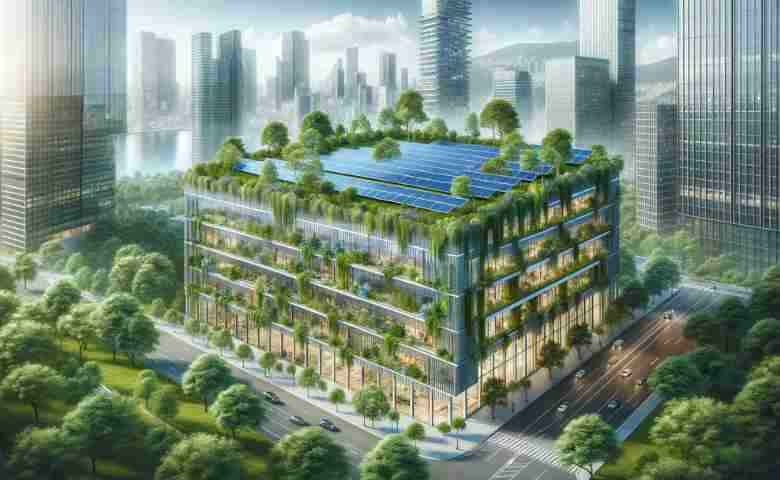Choosing Between Short-Term & Long-Term Investments: What You Should Know
- October 31, 2025
- Business
Investment means the allocation of funds to get huge returns after a specified period of time. It basically means putting… Read More

Today’s generation is seeing a drastic shift in climatic conditions worldwide. Unfortunately, this change is not necessarily for the good, as we can observe that polar ice caps of glaciers are melting, and there is a significant increase in the atmosphere’s average temperature. So, it is also high time that we, as responsible residents, take care of the water-related health of our homes and promote green and eco-friendly waterproofing for the houses.
Take Mumbai as an example: India’s metropolitan coastal city is prone to heavy humidity and monsoons. Recently, many waterproofing contractors in Mumbai have vowed to avoid the use of chemical waterproofing for their businesses or homes and, at the same time, promote the use of eco-friendly methods of waterproofing by employing natural substances and recycled materials for their sealants, which is slowly encouraging growth towards sustainable development.
Green waterproofing takes in all practices of using naturalistic materials and strong yet reusable water barriers. These practices are possible using reproduced sealants or recycled membranes extracted from dumped waste; on the other hand, traditional waterproofing has led to significant damages over the years, which led to deterioration of indoor air quality, extensive waste production, and water contamination.
Not only Mumbai but even Pune, an eco-conscious, progressing city, has seen demand for the promotion of greenways of waterproofing. Several waterproofing contractors in Pune have now started to utilise green materials and eco-friendly substances to cater to the city’s urban waterproofing needs; hence, this has proven to be a practical step towards environmental conservation and water harvesting.
Beyond merely shielding structures from water damage, the move towards green waterproofing aims to fundamentally address environmental issues. Conventional waterproofing materials, such as bitumen and chemical additives, can harm human health and contribute to pollution. VOCs, or volatile organic compounds, are frequently released by these materials and can lower air quality. On the other hand, non-toxic, recyclable, and biodegradable materials are used in green waterproofing, which makes buildings safer for both the environment and occupants.
For homeowners in areas like Pune and Mumbai, selecting eco-friendly waterproofing provides practically valuable benefits. Excellent insulation from green materials helps control interior temperature and save energy use. For example, reflective coatings reduce air conditioning requirements by preventing heat absorption during hot weather.
Waterproofing Contractors in Mumbai are teaching their employees to integrate sustainable practices and use green materials in their waterproofing businesses for huge skyscrapers and residential apartments where there is comparatively more sewage water conduction. These energy-efficient methods also ensure that the indoor air quality is average and prevent harmful fungus or mold growth. Fortunately, green waterproofing also acts as a natural coolant and de-humidifier for the home’s interior structures.
The emergence of environmentally friendly building techniques in Pune indicates the city’s efforts to promote sustainable urban expansion. The waterproofing contractors in Pune are leading this movement and are committed to employing eco-friendly products, such as recycled rubber and plant-based sealants, to reduce environmental harm while maintaining durability. These environmentally friendly techniques are essential where urbanisation is speeding up because they lessen the adverse effects of new building projects on the environment.
The emphasis on water conservation is one of the most significant benefits of green waterproofing in Pune. Rainwater harvesting is now a common feature of many systems, enabling homeowners to use rainwater for landscaping and other purposes. This is a wise decision for anyone who supports sustainability initiatives since it conserves water and eases the burden on municipal water systems.
Beyond its positive environmental effects, green waterproofing offers many benefits to property owners. One benefit of eco-friendly methods is that they typically survive longer than traditional methods, which means fewer repairs are required. This is particularly crucial in places like Mumbai, where the harsh weather can hasten the deterioration of buildings. For example, environmentally friendly waterproofing membranes are flexible and durable, which helps to keep them free from weather damage and cracking.
The topic of health and safety is another crucial advantage. Low-quality indoor air is caused by traditional waterproofing materials that leak volatile organic compounds (VOCs) and other toxic substances into the air. This is especially troubling for homes where families spend much time inside. By choosing environmentally friendly waterproofing options, homeowners may lessen their family’s exposure to hazardous materials and make their homes safer.